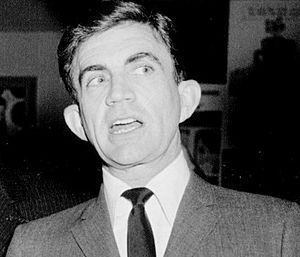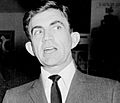Blake Edwards facts for kids
Quick facts for kids
Blake Edwards
|
|
|---|---|

Edwards in 1966
|
|
| Born |
William Blake Crump
July 26, 1922 Tulsa, Oklahoma, U.S.
|
| Died | December 15, 2010 (aged 88) Santa Monica, California, U.S.
|
| Other names | Sam O. Brown |
| Occupation |
|
| Years active | 1942–1995 |
| Spouse(s) |
|
| Children | 4, including Jennifer |
| Relatives | J. Gordon Edwards (step-grandfather) |
Blake Edwards (born William Blake Crump; July 26, 1922 – December 15, 2010) was a famous American film director, producer, screenwriter, and actor.
He started his career in the 1940s as an actor. Soon after, he began writing movie and radio scripts. Later, he moved into producing and directing for television and films. Some of his most well-known movies include Breakfast at Tiffany's (1961), Days of Wine and Roses (1962), The Great Race (1965), 10 (1979), and Victor/Victoria (1982). He also directed the very popular Pink Panther film series, starring British actor Peter Sellers.
Even though he was known for comedies, Blake Edwards also directed serious dramas, musicals, and detective films. Later in his career, he wrote, produced, and directed for the theater. In 2004, he received a special Honorary Academy Award for his amazing work in movies.
Contents
Early Life and Beginnings
Blake Edwards was born William Blake Crump on July 26, 1922, in Tulsa, Oklahoma. His mother, Lillian, later married Jack McEdward, who became his stepfather. Jack McEdward's father, J. Gordon Edwards, was a director of silent movies. In 1925, his family moved to Los Angeles, where his stepfather became a film production manager.
After finishing high school in 1941, Blake Edwards started working as an actor during World War II. He also served in the United States Coast Guard during the war. During his service, he had a serious back injury that caused him pain for many years.
Career Highlights
Blake Edwards first directed a television show in 1952 called Four Star Playhouse. He then helped create and write several TV shows, including The Mickey Rooney Show and the detective series Richard Diamond, Private Detective.
He also created, wrote, and directed the popular TV detective series Peter Gunn (1958-1961). This show featured music by Henry Mancini, who became a frequent collaborator on Edwards's films. Their partnership greatly helped the success of many of his movies.
Edwards was most famous for his comedies. However, he also directed serious films like the drama Days of Wine and Roses. His most successful work was with actor Peter Sellers in the Pink Panther film series. Edwards also directed the comedy 10, starring Dudley Moore and Bo Derek.
Operation Petticoat (1959)
Operation Petticoat was Blake Edwards's first major movie as a director. This film starred famous actors Cary Grant and Tony Curtis. It became a huge success for Universal Studios and made Edwards a well-known director.
Breakfast at Tiffany's (1961)
Breakfast at Tiffany's was based on a story by Truman Capote. This movie helped Edwards become a "cult figure" among many film critics. It was seen as a very important and romantic film in the early 1960s.
Days of Wine and Roses (1962)
Days of Wine and Roses starred Jack Lemmon and Lee Remick. This powerful drama further boosted Edwards's reputation as an important director.
Darling Lili (1970)
Darling Lili was a big movie that cost a lot to make. However, it did not do well with critics or at the box office. Despite its challenges, Edwards used interesting camera techniques in the film. The star of Darling Lili, Julie Andrews, married Blake Edwards in 1969.
Pink Panther Film Series
Blake Edwards directed most of The Pink Panther comedy film series. These movies starred Peter Sellers as the clumsy detective Inspector Clouseau. Edwards and Sellers often had disagreements while working together, but their collaboration was very successful.
Five of these films were original stories featuring Edwards and Sellers: The Pink Panther (1963), A Shot in the Dark (1964), The Return of the Pink Panther (1975), The Pink Panther Strikes Again (1976), and Revenge of the Pink Panther (1978). These films were very profitable. For example, The Return of the Pink Panther cost only $2.5 million to make but earned $100 million.
After Peter Sellers passed away in 1980, Edwards directed three more Pink Panther films. Trail of the Pink Panther (1982) used old footage of Sellers. Curse of the Pink Panther (1983) and Son of the Pink Panther (1993) were attempts to continue the series without Sellers. However, these later films were not as popular or successful. Blake Edwards stopped making films two years after Son of the Pink Panther was released.
Besides the Pink Panther movies, Edwards also directed Peter Sellers in the comedy film The Party.
Awards and Recognition
In 2004, Blake Edwards received an Honorary Academy Award for his lifetime achievements in film. He made a memorable entrance at the awards ceremony, with a stuntman pretending to be him crashing a wheelchair.
He also received several other important awards throughout his career:
- In 2004, he got The Life Career Award from the Academy of Science Fiction, Fantasy and Horror Films.
- In 2002, he received the Laurel Award for Screenwriting Achievement and a special Edgar Award for his career.
- In 2000, he was honored with the Contribution to Cinematic Imagery Award.
- In 1993, he received the Preston Sturges Award from the Directors Guild and the Writers Guild.
- In 1991, he received a star on the Hollywood Walk of Fame.
- In 1988, he received the Creative Achievement Award from the American Comedy Awards.
- In 1983, he was nominated for an Academy Award for Best Screenplay for Victor/Victoria. He also won Best Foreign Film and Best Foreign Screenplay awards in France and Italy for the same movie.
Edwards was nominated many times for awards like the Golden Laurel Award, Golden Globe, Directors Guild Award, and Emmy Awards for his directing and writing. He won the Writers Guild Award twice, for The Pink Panther Strikes Again and Victor/Victoria.
Silent-Film Style
Growing up in Hollywood, Blake Edwards was familiar with silent films. His stepfather was a studio production manager, and his step-grandfather was a silent-film director. He watched movies by famous silent comedians like Charlie Chaplin, Buster Keaton, Harold Lloyd, and Laurel and Hardy.
Edwards and Peter Sellers loved and understood the humor in silent films. They tried to bring this style into their own work, especially in the Pink Panther movies. After the success of the first two Pink Panther films, they used even more silent-film elements, like slapstick comedy, in The Party (1968). Many fans and critics consider The Party a masterpiece of silent comedy, even though it had some dialogue.
Personal Life
Blake Edwards married his first wife, actress Patricia Walker, in 1953. They divorced in 1967. They had two children, actress Jennifer Edwards and actor-writer-director Geoffrey Edwards.
In 1969, Edwards married actress Julie Andrews. They were married for 41 years until his death in 2010. He became the stepfather to Julie Andrews's daughter, Emma. In the 1970s, Edwards and Andrews adopted two daughters from Vietnam: Amy Leigh (Amelia) in 1974 and Joanna Lynne in 1975.
Edwards also shared about his 15-year struggle with an illness called chronic fatigue syndrome in a documentary film.
Death
Blake Edwards passed away on December 15, 2010, at the age of 88. He died from complications of pneumonia in Santa Monica, California.
Legacy
Blake Edwards was both admired and sometimes criticized as a filmmaker. However, many people recognized his important achievements throughout his career. Film critics like Peter Lloyd and William Luhr called him one of the best American directors of his time.
They especially praised his character Inspector Clouseau from the Pink Panther series, which he developed with Peter Sellers. Critics noted that Clouseau fit Edwards's unique view of the world. His early Pink Panther films were considered some of the best comedies ever made by an American director. At the time, Edwards's name as a director was a rare "marketable commodity" in Hollywood, meaning his name alone could attract audiences to a movie.
Films as Director
| Year | Title | Notes |
|---|---|---|
| 1955 | Bring Your Smile Along | also co-wrote story and screenplay |
| 1956 | He Laughed Last | also co-wrote story and screenplay |
| 1957 | Mister Cory | also screenwriter |
| 1958 | This Happy Feeling | also screenwriter |
| The Perfect Furlough | ||
| 1959 | Operation Petticoat | |
| 1960 | High Time | |
| 1961 | Breakfast at Tiffany's | |
| 1962 | Experiment in Terror | also producer |
| Days of Wine and Roses | ||
| 1963 | The Pink Panther | also co-screenwriter |
| 1964 | A Shot in the Dark | also co-screenwriter and producer |
| 1965 | The Great Race | also co-wrote story |
| 1966 | What Did You Do in the War, Daddy? | also co-wrote story and producer |
| 1967 | Gunn | also co-wrote story and co-screenwriter |
| 1968 | The Party | also co-wrote story, co-screenwriter, and producer |
| 1970 | Darling Lili | also co-screenwriter and producer |
| 1971 | Wild Rovers | also screenwriter and co-producer |
| 1972 | The Carey Treatment | |
| 1974 | The Tamarind Seed | also screenwriter |
| 1975 | The Return of the Pink Panther | also co-screenwriter and producer |
| 1976
The Pink Panther Strikes Again |
||
| 1978 | Revenge of the Pink Panther | also co-wrote story, co-screenwriter, and producer |
| 1979 | 10 | also screenwriter and co-producer |
| 1981 | S.O.B. | |
| 1982 | Victor/Victoria | |
| Trail of the Pink Panther | also co-wrote story, co-screenwriter, and co-producer | |
| 1983 | Curse of the Pink Panther | also co-screenwriter and co-producer |
| The Man Who Loved Women | ||
| 1984 | Micki & Maude | |
| 1986 | A Fine Mess | also screenwriter |
| That's Life! | also co-screenwriter | |
| 1987 | Blind Date | |
| 1988 | Sunset | also screenwriter |
| 1989 | Skin Deep | |
| 1991 | Switch | |
| 1993 | Son of the Pink Panther | also co-wrote story and co-screenwriter |
Images for kids
See also
 In Spanish: Blake Edwards para niños
In Spanish: Blake Edwards para niños
 | James B. Knighten |
 | Azellia White |
 | Willa Brown |


